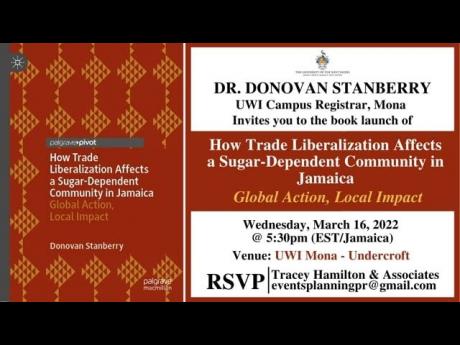Donovan Stanberry journeys back in time with book launch today
Less than three years after leaving his job as chief accounting officer in the agriculture ministry, campus registrar at The University of the West Indies, Mona, Dr Donovan Stanberry, will today take a virtual journey back in time, with the launch of his book, How Trade Liberalization Affects a Sugar-Dependent Community in Jamaica: Global Action, Local Impact.
The book, a spin-off from Stanberry’s doctoral thesis which he defended in 2017, and which examined the social and environmental impacts of the Government’s adaptation strategy for the sugar industry on the Monymusk Sugar-Dependent Area, is informed by the insight of a boy from Vere who grew up in the cane belt and observed at first hand the stratification that occurred and how this played out in terms of defining social relations in the wider Clarendon community, beyond the cane fields, factory and farm.
Stanberry’s intrigue about the dependency of an entire community on this one industry would go a far way in helping to fuel his interest in the lure of the sugar cane, and as fate would have it, his career gave him a ringside seat to the geopolitics that would redefine the role of sugar in Jamaica and reshape its hold on the local economy.
“I have always been struck as a trained agricultural economist that we have always tended to look at things from the macroeconomic perspective. We were always talking about employment, the failure of divestment, impact on gross domestic production and those types of macro statistics, but rarely did anyone zoom in on those statistics and ask themselves, what do they mean in the life of an ordinary person?” he told The Gleaner ahead of today’s launch.
The irony for Stanberry is that Jamaica knew that the decline in sugar was coming, long before it occurred, but still failed to prepare for life afterwards. The high unemployment and other negative impacts left in the wake of our loss of preferential access to the European market seemed to have caught local authorities flat-footed.
“This has not only cause local production to collapse, but has also devastated entire sugar-dependent communities,” the former civil servant lamented.
Devastating impact
While his focus is on the Monymusk area in Clarendon, the devastating impact of the fallout is replicated in Northern Trelawny, and is being blamed for the ongoing crime upsurge in Westmoreland and the devastating grip that poverty has had on the parish of St Thomas, since sugar lost its place as king.
The book shows clearly the lack of vision by successive political administration which failed to put in place any meaningful measures for diversification, and the author makes a very strong case as to how unimaginative our leaders have been.
Using case studies of countries of similar size and profile as Jamaica, like Mauritius and Belize, which were faced with the same set of circumstances – loss of preferential treatment and communities which were almost totally dependent on sugar cane, Stanberry shows that they were able to reform and restructure their economies around sugar cane by tapping into its versatility.
“In addition to sugar, cane also makes alcohol, as well as bagasse which, in addition to making a preformed board, can also be burnt to generate electricity. So there are other products than can come from the sugar and they have been able to do that and build a strong industry that will survive the changes in the European market,” he told The Gleaner.
In addition to identifying the mistakes and mishaps of the past, Stanberry also serves up some recommendations for the revival of sugar, but points to some glaring missed opportunities as well as some misplaced priorities.
For example, he notes that on a journey along Highway 2000 going to southern Clarendon, one can’t help but notice the approximately 40,000 acres of former sugar lands which have been thrown up. Stanberry points out that there are not many crops that can easily replace sugar.
“If you plant 40 acres of tomato, which is just one per cent of those plots, in three months when the tomatoes come in you would have a glut because our market is small and cannot absorb so much. So we have to deal with some kind of export crop or crops that can feed into industry, like orchard crops which can go into making juice.”
To find out more about How Trade Liberalization Affects a Sugar-Dependent Community in Jamaica: Global Action, Local Impact from an insider, be at The Undercroft, UWI, Mona, today at 5:30 p.m.


